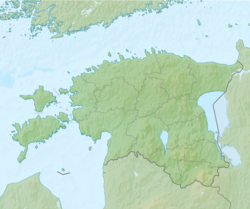Mõisaküla (Latvian: Muižciems; Meizakila) is a town in southern Estonia, part of Mulgi Parish of Viljandi County, just next to the border of Latvia. It is considered to be the smallest town in Estonia.
Mõisaküla | |
|---|---|
 | |
| Coordinates: 58°05′N 25°11′E / 58.083°N 25.183°E | |
| Country | Estonia |
| County | Viljandi County |
| County | Mulgi Parish |
| Area | |
| • Total | 2.2 km2 (0.8 sq mi) |
| Population (2021)[1] | |
| • Total | 756 |
| • Rank | 46th |
| Time zone | UTC+2 (EET) |
| • Summer (DST) | UTC+3 (EEST) |
The town has 32 streets, with the total length of 15,5 km. There are 401 dwellings in Mõisaküla, consisting mainly of small 1- or 2-floor small houses.
The closest regional centres are Viljandi (49 km away) and Pärnu (63 km). It is 189 km from the capital city, Tallinn, and 125 km from the second largest city, Tartu.
History
editMõisaküla arose on the fens of Abja manor (mõis), after which it is named. It was a large railway hub in the 1920s and 1930s, when two narrow-gauge lines came through Mõisaküla, serving all of Estonia until the 1970s when the Soviets closed both lines.[2] It became a town on 1 May 1938.
A Lutheran church was established in 1934, but was burned and destroyed in 1983; restoration of the church started in 2005 and the church reopened in 2014.[2]
Mõisaküla is the birthplace of Olympic weightlifting medalist Arnold Luhaäär. Luhaäär's medals are on permanent display at the Mõisaküla Museum. It is also the birthplace of stage and film actress Rita Raave.
Twin towns – sister cities
editThe former municipality of Mõisaküla was twinned with:
Gallery
edit-
Mõisaküla railway station
-
Municipal building (August 2012)
-
Estonian Orthodox church in Mõisaküla
References
edit- ^ "Population by sex, age group and place of residence after the 2017 administrative reform, 1 January". Statistics Estonia. Retrieved 2021-12-27.
- ^ a b Neil Taylor (1 March 2014). Estonia. Bradt Travel Guides. pp. 253–255. ISBN 978-1-84162-487-7.
- ^ "Ystävyyskaupungit ja -kunnat". mikkeli.fi. Archived from the original on 29 April 2014. Retrieved 28 April 2014.


